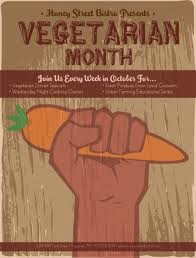 A professor of the “politics and philosophy of food,” named Chad Levin, advocates for vegetarianism in a distinctly political advocacy paper in the Chronicle of Higher Education. Ironically, given what he writes, he claims that his vegetarianism is not “political.” You be the judge. From”The Vegetarian Lesson:”
A professor of the “politics and philosophy of food,” named Chad Levin, advocates for vegetarianism in a distinctly political advocacy paper in the Chronicle of Higher Education. Ironically, given what he writes, he claims that his vegetarianism is not “political.” You be the judge. From”The Vegetarian Lesson:”
But is vegetarianism political? Even though my abstinence from meat is motivated by a set of core principles about the treatment of animals, workers, and the environment, it does not necessarily follow that abstaining from meat constitutes a political position. Indeed, the decision not to eat meat does not necessarily enter the terrain of politics (often defined as the decisions over who gets what, when, and how), nor does it engage significantly with the question of power.
He’s right. Merely being a vegetarian is not necessarily a political act. But Levin’s vegetarianism is very political, as is the rest of his article. He decries that writers like Peter Singer reduce vegetarianism to an issue of “choice,” and then writes about having to respond when student ask why he is vegetarian (how would they know if he didn’t tell them?):
The very question—inquiring about the values that guide my consumer choices—seems biased against a political response, predicated as it is on the assumption that how or what we eat is primarily an issue of individual choice. Imagine the alternative, rarely posed, question: “Why are most Americans not vegetarian?” One would have to be an ideologue of the highest order to hear that as a question about dietary choice. Surely that question invites a discussion of agricultural subsidies, USDA regulations, public-school financing, and corporate lobbying.
Today, I can imagine two responsible replies to my students, and each comes with its own tragic irony. The first answer is partly a protest against having my personal life dragged into the arena of classroom spectacle, but more fundamentally a refusal to engage in a discourse that so readily slides from a consideration of the political economy of meat into one of individual dietary choice. The irony of this answer—something on the order of “That’s none of your business” or “Figure it out for yourself”—is that in order to resist having opposition to the slaughter of animals reduced to a solitary ethical position, I invoke a zone of privacy or an ideal of self-reliance that is literally immune to politics. In other words, in pursuit of a political vocabulary for vegetarianism, I refuse to participate in politics.
In other words, Leven wants it to be political, but is frustrated because, in his view, it isn’t due to an insufficiently political lexicon around the subject, a problem caused by the primary advocates such as Singer, reducing the issue to one of choice—which again, in Levin’s view, is insufficiently political:
The second answer, the one I prefer (at least right now), betrays a deep cynicism about the very possibility of politics in this consumerist age. The answer reflects a resignation to the sense that what passes for politics today is really just the sum total of consumer choices, and to the fact that ethical reasoning is inadequate for confronting such institutionally entrenched cultural norms as the torture of animals or the squandering of fossil fuels. It is this answer, however, that gestures toward the lesson of the class: that a vibrant food politics would focus less on what we choose to eat and more on how the production, distribution, and consumption of food affords us—as individuals, societies, and a species—both power and privilege over others.
Gee, I’ll bet his class is really even-handed.
But here’s the thing: The meme that vegetarianism is “cruelty free” is phony-baloney, unless one restricts his diet to oranges or something. The mice, snakes, birds,lizards, and other small animals torn to pieces in combines, the rats and mice poisoned in silos, and the animals burned in fields, don’t go gently into that good night. They die in more terror and agony than any steer or pig killed at a slaughter house.
This isn’t to say that food animals could not be treated better. I think improving animal welfare is a good and noble cause. But it is to say, that vegetarians also have animal blood and pain on their own hands. Not that they are bad for so having: It is just that we can’t live without killing animals—no matter the political choices we make around food.
